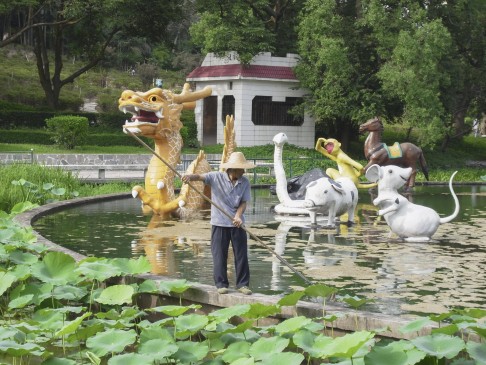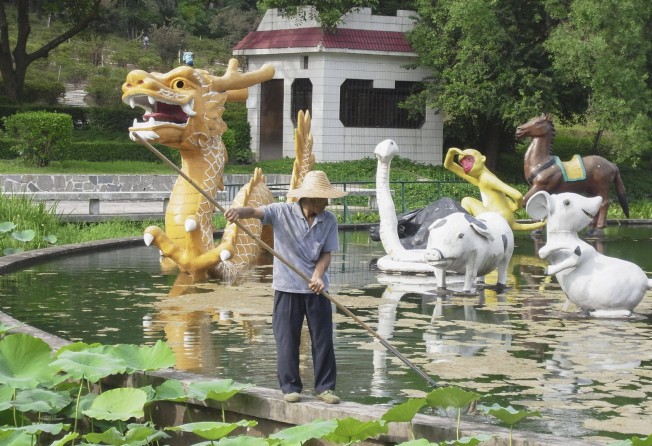
Zhongshan marries old and new China for a quirky weekend getaway
A 90-minute ferry ride from Hong Kong up the Pearl River, Zhongshan flips from 21st-century modern to pre-Cultural Revolution historic at the turn of a street corner. Words and pictures by Ed Peters.


Zhongshan is a foreign country - they do things differently there.
Ninety minutes' ferry ride from Tsim Sha Tsui up the Pearl River, there's none of Macau's casino glitz, the feral aura of Shenzhen nor the grittiness of Guangzhou. The city jocularly known as Z-burg flips from 21st-century modern to pre-Cultural Revolution historic at the turn of a street corner. As a getaway from Hong Kong, it's convenient, different, surprisingly un-urban and admirably quirky.

Hometown to he-who-needs-no-introduction Sun Yat-sen (before he skipped off to Honolulu) and part of the backdrop to the first opium war, Zhongshan doesn't lack for history. In more recent times the city planners have been hard at work, bulldozing with an alacrity tempered by a hefty soupcon of sensitivity. There's no underground railway, but dotted around the metropolis are ranks of bright green bicycles, available to anyone who can work out the mildly Byzantine borrowing system.

The major new boulevards are shaded by lofty trees, signage is bilingual if not entirely grammatical and, at first blush, there's much that seems familiar, with Sheraton, Holiday Inn and Crowne Plaza hotels, Watsons and ParknShop, plus the ubiquitous Starbucks.
Best of all, the city's parkland has been preserved and expanded. Yixianhu, which borders a large lake, is typical, with squads of men and women of a certain age pummelling the ping-pong tables and rusty exercise machines, tai-chi fanatics engaged in their distinctive ballet, and a circle of grizzled card players engrossed in multiple hands of dou dizhu, stopping only for the winner to attach clothes pegs to the losers' ears.

Beside the Shiqi river, Qijiang harks back to Zhongshan's industrial past. Built on the site of a bankrupt shipyard, the park could be a metaphor for the city's evolution. Verdant lawns and shrubberies have been planted around the dry docks and workshops where the vessels were once welded together, steel plate by steel plate. A former godown houses temporary art expos and the hulk of an old ship acts as an adventure playground on which youngsters let off steam.
Pleasure boats cruise up and down the river from the park's jetty, but while the view is refreshing, the onboard commentary is relentless.

On the opposite bank, Zhongshan's Ferris wheel is as intellectually challenging as Hong Kong's. The adjacent shopping mall is filled to the brim with sterile marble, glass and designer labels, yet oddly free of shoppers. But head east and walk a dozen steps up Guangming Road, and it's yesterday once more. Sacks of pepper, cinnamon and cardamom are piled high within the Stygian depths of the spice market, stacks of cheap crockery spill onto the pavement and a non-stop convoy of motorised barrows and three-wheelers load up with gallons of brandy and cartons of cigarettes from tiny roadside booths that seem to have room for little else apart from the proprietor and his calculator.

It's a sharp contrast with the parallel Sunwen Road, which has been closed to traffic and given the tourism-zone treatment. Hip - at least by Z-burg's yardstick - boutiques, souvenir shops and restaurants inhabit picturesque century-old colonnades on either side of the pedestrian precinct, their sound systems linked to an iPod Shuffle. The marketing emphasis is firmly on prevailing trends rather than the sort of longevity and quality the founders of Wing On and Sincere, both Zhongshan natives, were aiming for when they started out.
But keep walking along Sunwen, leave the tat behind, and Z-burg performs one of its characteristic volte-faces.

The Zhongshan Radio Museum is a barely credible curiosity showcasing about 200 radios, some manufactured as recently as the 1980s, others pre-war, and all collected and donated by Zhongshan's most philanthropic citizen, Qiu Jianqiu. None of the staff have been cleared to release any biographical details, but within minutes of passing through the museum's stately entrance, it's blindingly obvious Qiu had a lifelong passion for wireless communication in the old-fashioned sense of the word.
How the radios - well preserved and displayed, and many seemingly influenced by Soviet design - survived the rampant enthusiasm of the Red Guards, let alone the depredations of time and climate, is a minor mystery. But the museum is stunningly popular, with grandparents reminiscing while their grandchildren gape in awe at the antediluvian technology. And all for an entrance fee of five bucks.

If Zhongshan ever felt the need of an acupuncture session, Shagang Xu market - an intriguingly ramshackle encampment spread over a couple of hectares beside Qiwan Road, and an ode to the joy of an unplanned economy - is where they'd start sticking in the needles. Open daily, it kicks into overdrive on the third, sixth and ninth days of the lunar month, a legacy of the times when the city was bordered by farms rather than echoing apartment blocks.
"Higgledy-piggledy" just about describes the market's more orderly parts. Traders deal in everything from stout pots and pans to muslin-swathed bees' nests complete with a swarm. In its dimly lit alleyways, cobblers and tailors bend to their tasks, hucksters trumpet miracle goods, Uygur bakers dangle pita bread piping hot from the oven and antique dealers - the job description is notional - squat beside Little Red Books, social-realist artworks and other assorted Mao-morabilia laid out on red blankets.

Punters come to get their hi-fi fixed or iPhone unlocked, a new set of curtains, a haircut, a stun gun, a fish tank, an incense burner, some fresh cuts of meat or whatever fruit's in season; or possibly just to meander, and relish an alfresco retail carnival whose wares might have evolved over the centuries but whose ambience has changed not a whit.
"Just look at this juicer, missus. Buy that in some fancy department store and you won't see any change out of 100 kwai. A hundred kwai, FFS. Never mind 100, never mind 50, never mind 40; who'll give me 35 yuan for the best juicer in the whole of Guangdong?"